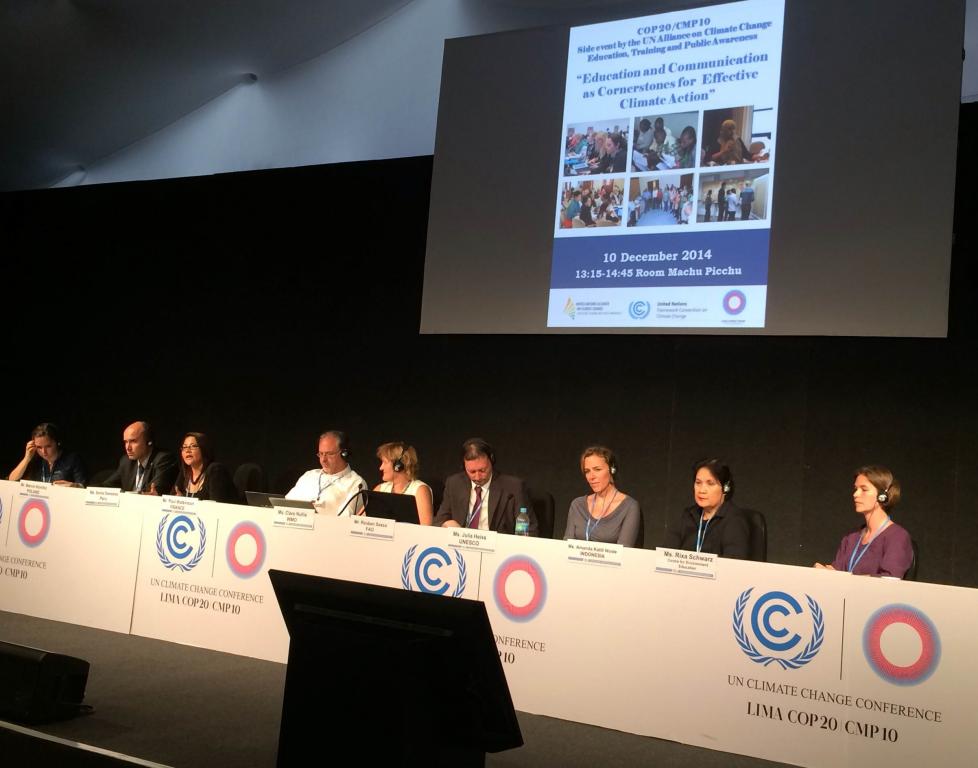UN CC:Learn in Indonesia: A Cornerstone for Implementing Article 6 of the Climate Convention
10 December 2014, Lima, Peru - Indonesia’s National Climate Change Learning Strategy was featured at a side event on “Education and Communication as Cornerstones for Effective Climate Actions” in Lima, Peru on 10 December 2014 in the framework of the annual Climate Conference (COP 20). Ms. Amanda Katili-Niode, Head of the Secretariat of Indonesia’s Council on Climate Change (DNPI) pointed out that the learning strategy was an important step towards implementing Article 6 of the Convention which deals with education, training and public awareness-raising. Ms. Katili-Niode further explained that the learning strategy is feeding into a broader Article 6 strategy (known as the ‘Stranas’) which the Council is currently developing. The Stranas also covers public participation and access to information.
Indonesia’s Climate Change Learning Strategy was launched in August 2013 by the Special Envoy to the President of Indonesia on Climate Change, Mr. Rachmat Witoelar. The Strategy was supported by UN CC:Learn and prioritises three areas: building human and institutional capacity to address climate change; integrating climate change in the national education system; and improving public awareness and knowledge. So far strategy implementation has focused on building a climate change knowledge-management network with leading research institutions from Indonesia, as well as technical training on REDD+ (short for ‘Reducing Emissions from Deforestation and Forest Degradation’).

The COP 20 side event was organized by the UN Alliance on Climate Change Education, Training and Public Awareness and involved a number of panelists, including Ms. Clare Nullis, World Meteorological Organization (WMO); Ms. Julia Heiss, UN Educational, Scientific and Cultural Organization (UNESCO); Mr. Reuben Sessa, Food and Agriculture Organization of the UN (FAO); Ms. Rixa Schwarz, Centre for Environment Education India; as well as Ms. Amanda Katili Niode from Indonesia. The panel reflected the strong commitment of all Parties to implement Article 6 of the UNFCCC, based on the Doha Work Programme that was launched two years ago.
The event was jointly opened by Mr. Paul Watkinson, Head of Delegation and member of the COP 21/CMP 11 Incoming Presidency Team, France and H.E. Mr. Marcin Korolec, COP 19/CMP 9 President and Secretary of State, Poland, who highlighted the importance of the Lima Ministerial Declaration on Education and Awareness-raising.
The moderator of the event was Ms. Claudel Pétrin-Desrosiers, Vice-President for External Affairs of the International Federation of Medical Students' Associations.
Related link
UN CC:Learn is a partnership of more than 30 multilateral organizations supporting countries to design and implement systematic, recurrent and results-oriented climate change learning. At the global level, the partnership supports knowledge-sharing, promotes the development of common climate change learning materials, and coordinates learning interventions through a collaboration of UN agencies and other partners. At the national level, UN CC:Learn supports countries in developing and implementing national climate change learning strategies. Through its engagement at the national and global levels, UN CC:Learn contributes to the implementation of Article 6 of the UNFCCC on training, education and public awareness-raising, and the 2012-2020 Doha Work Programme. Funding for UN CC:Learn is provided by the Swiss Government and UN partners. The Secretariat for UN CC:Learn is hosted by UNITAR.
Image 1: Panelists at the UN Alliance side event, including Ms. Katili-Niode (second from the right)

